You can keep up to date with all the latest developemnts at our new live blog that Martin is taking care of here:
Protests in Germany against restrictions as French cases set new record – as it happened
Number of new cases in California falls; Cuba restricts internal travel; English hospitals stress test for a second wave. Follow all the developments
Sat 12 Sep 2020 18.39 EDT
First published on Fri 11 Sep 2020 19.21 EDT- France records new daily record of over 10,000 new infections
- UK records nearly 3,500 new cases in last 24 hours
- Summary
- New coronavirus cases in Scotland hit four-month high
- Oxford University resumes vaccine trials
- NHS workers rally in London to demand pay rise
- Lesbos 'facing public health emergency' over destroyed migrant camp
- Toots and the Maytals singer dies with suspected Covid-19
- Fines could be necessary for isolation breaches, says Gove
- One in nine people in the UK under lockdown restrictions
- England on a coronavirus "knife edge" says former chief science advisor
- India records second record daily jump in Covid-19 cases
- Summary so far
- Two children contract Covid-19 in Queensland
- At least three arrests at Melbourne lockdown protests
- Canada reports zero Covid-19 deaths for the first time since March
- Queensland records three new cases
- NSW records six new cases
- Regional Victoria 'on track' to reopen next week
- Mexico's cases rise to 658,299
- Victoria records lowest new cases since June
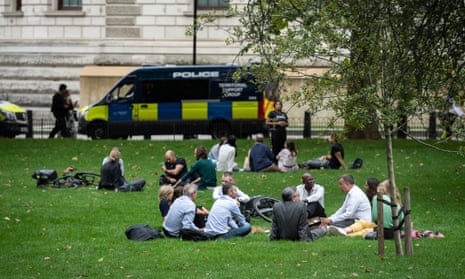
Live feed
- France records new daily record of over 10,000 new infections
- UK records nearly 3,500 new cases in last 24 hours
- Summary
- New coronavirus cases in Scotland hit four-month high
- Oxford University resumes vaccine trials
- NHS workers rally in London to demand pay rise
- Lesbos 'facing public health emergency' over destroyed migrant camp
- Toots and the Maytals singer dies with suspected Covid-19
- Fines could be necessary for isolation breaches, says Gove
- One in nine people in the UK under lockdown restrictions
- England on a coronavirus "knife edge" says former chief science advisor
- India records second record daily jump in Covid-19 cases
- Summary so far
- Two children contract Covid-19 in Queensland
- At least three arrests at Melbourne lockdown protests
- Canada reports zero Covid-19 deaths for the first time since March
- Queensland records three new cases
- NSW records six new cases
- Regional Victoria 'on track' to reopen next week
- Mexico's cases rise to 658,299
- Victoria records lowest new cases since June
Here a few impressions from around the globe:
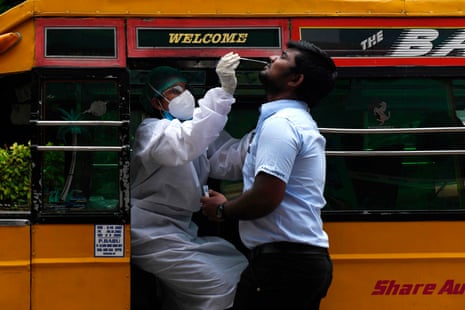


Brazil registered 814 coronavirus deaths over the last 24 hours and 33,523 additional cases, the nation’s health ministry said on Saturday evening.
The South American country has now reported 131,210 total deaths and 4,315,687 confirmed cases of the novel coronavirus.
Brazil ranks third in the world after the US and India in terms of total coronavirus cases, and it is second only to the US in terms of deaths.
El Salvador’s government said on Saturday it plans to reopen airports for international flights starting on 19 September, but with a twist: incoming passengers will be required to show a negative PCR coronavirus test no more than three days old.
Anyone lacking the test would be denied entry, according to the Associated Press.
The new measures were contained in a notice to airlines published by the country’s port authorities.
It was unclear whether the requirement would apply to Salvadoran citizens, who have a constitutional right to re-enter their country.
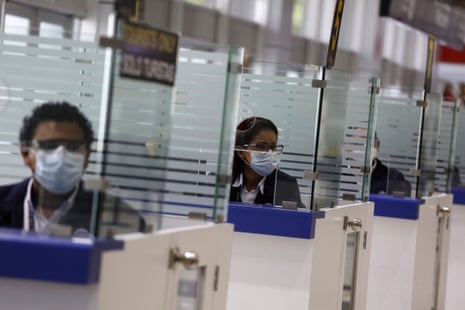
The Central American country has enacted some of the regions strictest pandemic measures, such as closing borders, imposing a national quarantine and dispatching police and the army to detain violators.
Some of those measures have been challenged in court.
Roberto d’Aubuisson, the mayor of the city of Santa Tecla, who had been trapped outside the country for months after the border and airport closures in March, called on the government to clarify if the new measures apply to Salvadorans.
El Salvador has seen 26,851 confirmed coronavirus cases and 782 deaths.
The UN refugee agency is stepping up efforts to curb the spread of coronavirus among tens of thousands of Syrians in camps in Jordan after the first cases were confirmed last week, the head of the agency in the country said on Saturday.
The UNHCR confirmed three cases in the country’s largest camp for Syrian refugees, Zaatari, near the border with Syria, and two cases in a smaller camp, Azraq.
The infections in the two camps that house a total of around 120,000 refugees were the first confirmed cases since the pandemic was first reported in the kingdom last March, Reuters reported.
“The developments this week have obviously been a worrying situation for all, but especially for refugees living in the camps.
“Crowded spaces and cramped living conditions make social distancing difficult,” said Dominik Bartsch, the UNHCR representative in Jordan.

The refugees who tested positive for coronavirus have been sent to an isolation area set up by the Jordanian government near the Dead Sea while families of those in contact with them have been quarantined inside the camp, the UN agency added.
Jordan’s health ministry is, meanwhile, conducting thousands of tests, restricting movement in and out of the camps and training medical staff, Bartsch said.
The infections in the camps came as Covid-19 cases are rising sharply in the country as a whole since the beginning of the month.
Jordan is a major host country for Syrian refugees who have fled an almost decade-long civil war in their homeland.
There are about 655,000 UN-registered Syrian refugees in the kingdom.
Thousands of Israelis protested against prime minister Benjamin Netanyahu in Jerusalem on Saturday again over his alleged corruption and the government’s handling of the coronavirus pandemic.
The crowd rallied outside Netanyahu’s residence, blowing whistles, waving signs and flags and calling for his resignation.
Smaller protests were held along bridges at major intersections in cities across Israel.
Israeli media estimated that about 10,000 people attended what has become a weekly demonstration in Jerusalem.
The protests built up over the summer as Covid-19 cases spiked.
With a population of nine million, Israel has reported almost 150,000 infections cases and more than 1,000 deaths.

The country is in a recession as a result of the pandemic and the unemployment rate is hovering above 20%.
A survey published in August by the Israel Democracy Institute found that 61% of Israelis did not trust Netanyahu to manage the coronavirus crisis.
Some critics of the prime minister say he is preoccupied with his corruption trial on charges of bribery, fraud and breach of trust.
Netanyahu denies any wrongdoing.
Exasperated parents in England have complained of a test-and-trace system still in “shambles”, with some struggling to book appointments for their children who have developed symptoms since returning to school.
My colleague Aaron Walawalkar has more.
Doctors have warned that bad air quality stemming from smoke produced by the wildfires ravaging western states in the US could make people more susceptible to getting infected with coronavirus, CNN reported.
“Multiple studies have shown a correlation between higher levels of pollution in the air and greater spread and severity of Covid-19 cases,” said Dr Brad Spellberg, chief medical officer of the Los Angeles County-USC Medical Center, citing several studies conducted in the US, China and Italy.
“Some studies have also shown that exposure of lung tissue to pollution may increase susceptibility to viral infections.”
Dr Rekha Murthy, an infectious disease specialist at Cedars-Sinai Hospital in Los Angeles, echoed Spellberg’s comments.
“Whenever the lining of the lung or the airways become inflamed or damaged, it increases the potential for inhaled viral particles to take hold in the lungs and cause infection,” Murthy said.

France records new daily record of over 10,000 new infections
French health authorities on Saturday reported 10,561 new confirmed coronavirus cases in the past 24 hours, a new daily record as the number topped 10,000 for the first time.
The latest daily count, surpassing the previous record of 9,843 new infections reported on Thursday, highlights a resurgence of the disease in France.
The rise led the government to outline additional measures on Friday to avert a return to the general lockdown put in place earlier in the year.
The prime minister, Jean Castex, promised steps to speed up tests and toughen local measures in high-infection zones.
In its daily update, the French health ministry also reported that 772 clusters were being investigated, an increase of 86 in the past 24 hours, Reuters reported.
Over the past week, there had been 2,432 arrivals in hospital for Covid-19, including 417 entries into intensive care units, the ministry said.
The death toll since the start of the coronavirus outbreak this year in French hospitals and nursing homes has reached 30,910, with 17 deaths recorded in the past 24 hours, it added.
Portugal’s construction and manufacturing businesses are helping to get the economy back on its feet, Bloomberg reported.
“The economy is recovering fast, better than expected both in Portugal and Europe,” finance minister Joao Leao said on Friday in Berlin, where he is attending a meeting of European finance ministers, but warned that the outlook was still “very uncertain”.
In the third quarter Portugal’s construction industry is “doing very well” and manufacturing is recovering, Leao said, but stressed tourism was still badly affected.
The Portuguese economy is forecast to contract by 9.8% this year, after six years of growth that helped cut the unemployment rate and reduce the budget deficit.
Portugal has the third-highest debt ratio in the eurozone behind Greece and Italy.
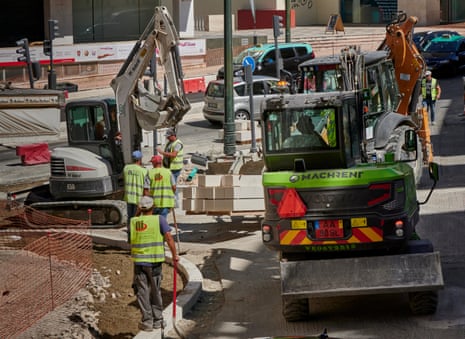
Although most of California is still in lockdown, officials are starting to see signs of hope as new cases and hospitalisations drop, the Los Angeles Times reports.
America’s most populous state still has the most cases in the country, but when adjusting for population, other states such as Florida, Arizona, Georgia and Louisiana are doing worse.
Over the last week, an average of 93,527 tests have been conducted each day, and the statewide positivity rate has decreased to 3.7%.
But the crisis is far from over.
As of 11 September, 14,269 Covid-19 deaths had been recorded in California, and on Saturday morning, total confirmed infections stood at 755,705.

On Friday California reported its biggest jump in deaths in five days, and over the past week, the state has averaged 3,464 new cases and 89 new deaths per day.
As seen in many other places, race disparities persist: Latinos in the state are now 3.4 times more likely to test positive than white people.
The Venice Film Festival is wrapping up the first in-person Covid-era international cinema showcase, with critics, filmmakers and actors cheering organisers for having dared to hold the festival amid a pandemic and for demonstrating how to go to the movies again safely.
The festival’s coveted Golden Lion awards were being handed out Saturday night before a masked audience conspicuously lacking in Hollywood star power, given that coronavirus travel restrictions kept all but a few American productions away, the Associated Press reports.
Eighteen films were vying for the top awards in the main competition, including a record eight directed by women.
That the 10-day festival took place at all was something of a miracle, given that northern Italy in late February became ground zero for Europe’s coronavivrus outbreak.
The Cannes Film Festival was cancelled and other big international festivals in Toronto and New York opted to go mostly online.

But after Italy managed to tame its infections with a strict 10-week lockdown, Venice decided to go ahead, albeit under safety protocols that would have previously been unthinkable for a festival that has prided itself on spectacular visuals and glamorous clientele.
Face masks were required indoors and out.
The public was barred from the red carpet and paparazzi, who would normally chase after stars in rented boats as they arrived on the Lido aboard water taxis, were given socially distanced positions on land.
While its too soon to say if the measures worked, there were no immediate reports of infections among festival-goers and compliance with mask mandates and social distancing appeared to be high.
Hospitals in England are conducting “major incident” stress tests on wards to check if they are ready for a second wave of Covid-19, as the number of admissions begins to climb.
Coronavirus cases have been doubling roughly every seven days and there are signs the increase is beginning to filter through to hospitals.
Last Wednesday, 136 patients were admitted in England, twice as many as on any day in the previous week, with a total of 863 people receiving treatment.
My colleague James Tapper reports.
The French prime minister, Jean Castex, has tested negative for coronavirus again and will come out of self-isolation on Saturday, a week after being in contact with someone who had a positive result, his office said, according to Reuters.
Castex had already tested negative for Covid-19 since sharing a car last weekend with the director of the Tour de France cycle race, who later tested positive.
France is grappling with a resurgence in coronavirus cases, and on Friday the prime minister outlined plans to speed up testing and toughen measures in certain cities as the government seeks to avoid a repeat of the spring’s nationwide lockdown.
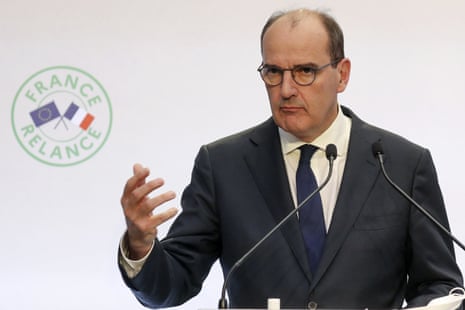
Several thousand people protested in German cities on Saturday against measures imposed to prevent the spread of coronavirus, while hundreds marched in the Polish capital Warsaw.
About 8,000 people marched in the southern German city of Munich, according to a police estimate, most of them ignoring a city ordinance requiring the wearing of masks.
At least a thousand turned out in Hanover, central Germany and there was another demonstration in the western city of Wiesbaden.
Tens of thousands turned out for similar demonstrations last month in Berlin.
The movement is made up of a number of different groups, from self-declared “free thinkers” to anti-vaccine campaigners, conspiracy theorists and far-right activists.
Although clashes marred the last protest in Berlin late in August there have been no reports of trouble so far on Saturday.
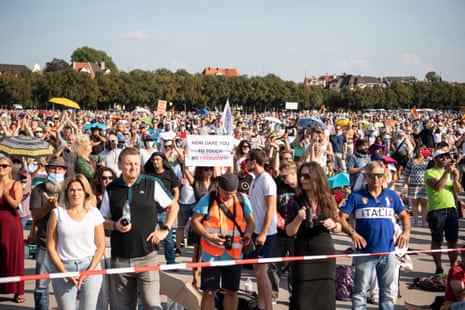
The German chancellor, Angela Merkel, said in a statement on Saturday she understood why some people had a problem with the restrictions being imposed. She acknowledged that people were free to criticise government policy in peaceful protests.
And in what appeared to be a response to some protesters’ claims of being censured, she pointed out that many people envied Germany for the freedom accorded people to publicly disagree and demonstrate.
In the Polish capital, Warsaw, meanwhile, several hundred people joined a similar protest that marched through the city centre.
Some protesters carried placards denouncing what they say are the “lies” told about the pandemic.
Others placards denounced the Microsoft billionaire-turned-philanthropist Bill Gates – the target of conspiracy theories about the virus – or called for the resignation of the government, AFP reports.
Cuban state media reported on Saturday that interprovincial transportation would be shut down and a curfew in Havana extended until the end of the month, as a surge in coronavirus cases in the capital spreads to other areas.
While most of the country remains at a new normal with schools and retail activity open, local authorities have been tightening enforcement of wearing masks, social distancing and other measures, and imposing quarantines wherever cases appear, Reuters reports.
Cuba had mostly contained its coronavirus outbreak by the end of June by isolating patients and contacts, and eased lockdown restrictions.
But it tightened them again in Havana by August and has yet to contain a surge in cases there with about 200 reported over the last week.
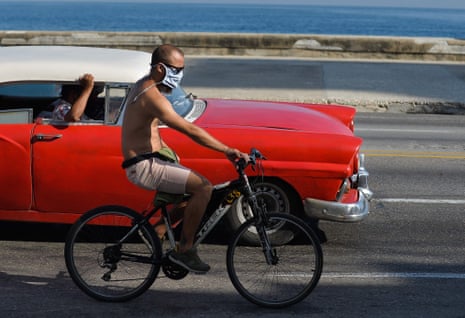
There have been smaller outbreaks in a handful of Cuba’s 14 provinces.
Central Ciego de Avila province has suffered the worst outbreak to date after Havana with cases reaching 28 of 60 reported in the country Saturday. All but a few of the remainder were in Havana.
One hundred patients were moved to a hospital in neighbouring Camaguey province from Ciego de Avila on Thursday because of a shortage of hospital space.
In August, a brigade of nurses marched off from eastern Granma province to the capital as if they were some of the 4,000 medical staff sent abroad to battle the pandemic.
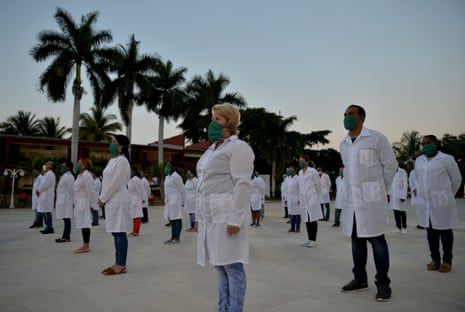
While just under 4,700 cases have been reported since the first one in March and only 108 deaths, the US-embargoed Caribbean nation has been all but bankrupted by the pandemic’s toll on tourism, remittances, investment and trade.
Economic growth is now forecast to drop by close to 10% this year according to various international organisations and there are long lines for basic goods and shortages of certain foods and medicines.
UK records nearly 3,500 new cases in last 24 hours
The UK reported 3,497 confirmed new cases of coronavirus, according to government data published on Saturday, compared with 3,539 a day earlier.
It also reported a further nine new deaths from Covid-19.
Friday’s figure was the largest number of daily cases to be reported since mid-May, and Britain is to bring in a new ban on social gatherings on Monday to curb the increasing rise in infections.
Summary
Here the latest key developments at a glance:
- Oxford University has announced that clinical trials of its coronavirus vaccine – under development with the pharmaceutical giant AstraZeneca – are to resume in the UK, after the trials were suddenly halted last Sunday when a participant fell ill.
- Daily coronavirus cases in Scotland have hit a four-month high, after a total of 221 people have tested positive for the virus in the past 24 hours.
- Oxygen supply has grown scarce in parts of India that are particularly hard-hit by coronavirus.
- The Netherlands has reported 1,231 new cases of coronavirus, as well as one further death.
- Athens has become the centre of what senior government officials are calling a “troubling” surge in cases in Greece.
- In England, people have been urged not to have a “party weekend” before the government’s “rule of six” restrictions come into force on Monday.
- Russia reported 5,488 new coronavirus cases on Saturday, bringing the tally to 1,057,362, the fourth largest in the world.
- Hungary’s health authorities on Saturday reported 916 new infections, with Saturday’s tally being 25% higher than the previous record of 716 new cases, reached on Friday.
- The United Arab Emirates has reported its highest daily rise in confirmed cases of coronavirus since the start of the pandemic, with 1,007 new infections found.
- Greece’s alternate migration minister says the Aegean island of Lesbos is facing a public health emergency after fires this week devastated its vastly overcrowded Moria migrant camp.
Pfizer Inc and BioNTech SE have proposed to the US Food and Drug Administration (FDA) to expand the enrollment of their phase 3 pivotal Covid-19 vaccine trial to up to about 44,000 participants, the companies said on Saturday.
The initial target figure for the trial was up to 30,000 participants, which the companies said they expect to reach by next week, Reuters reports.
According to the Pfizer website, the company uses more than 120 clinical trial sites in their efforts to develop a vaccine, and as of last Monday, 25,189 trial participants had already enrolled.
The proposed expansion would allow the companies to enrol people as young as 16 and people with chronic, stable HIV, hepatitis C and hepatitis B.
Drugmakers racing to develop a safe and effective coronavirus vaccine pledged in July to ensure their larger clinical trials would include diverse sets of volunteers.
“Diversity in clinical trials is a priority for Pfizer and is critical given that Covid-19 disproportionately impacts communities of color in the US,” Pfizer’s chief business officer John Young said in a US congressional hearing in July.
If the study is successful, the companies could submit the vaccine for regulatory approval as early as October, putting them on track to supply up to 100 million doses by the end of 2020 and 1.3 billion by the end of 2021.